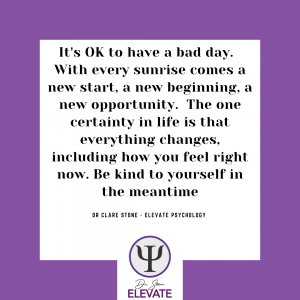Dealing with a Bad Day
‘I’m having a bad day’ – What can I do about it?
Clare’s bad day
At the start of this week, I was looking for an inspirational quote that encapsulates the message that it is OK to have a bad day, that it will pass. Scrolling down page after page I realised that many of the quotes just didn’t fit. They spoke of ‘fighting through it’, or ‘not giving up’ or ‘always thinking positive’. None of these seemed helpful. Particularly when in the midst of a bad day, or experiencing the aftereffects of one, ‘the hangover stage’, you just don’t have the energy for any of that crap!
I had a bad day on Monday. I am not even really sure why, nothing in particular seemed to spark it off. Perhaps the clocks changing and horrible noisy weather meant I was overly tired and lack of sleep made me grumpy, perhaps it was because I was feeling a little under the weather that day, perhaps all the seemingly small frustrations of life during COVID times had built up, perhaps it is because my youngest had a flare-up of a medical issue that we thought was resolved, or perhaps it had something to do with my hormones, or where the moon is in its lunar cycle. Who knows! More likely it is not just one of those things but simply an accumulation of them. However, in the throes of the bad day, it didn’t feel helpful to try and figure out the why’s at this stage. The more pertinent question was how do I deal with this?
What not to do
Previously I would have come from a place of thinking that because there was nothing really that bad going on in my life that I somehow had no right to feel this way. ‘Other people have it so much harder than I do’, or the famous ‘it could be worse’, so why should I be feeling like this? Sound familiar? Comparing against others is often not a helpful remedy. This basically invalidates the genuine emotions you are experiencing, and instead of engaging with them in a healthy way, this response tends to shut them down. Don’t get me wrong it can be helpful to keep things in perspective, but there is no right or wrong when it comes to your emotions. You feel how you feel. Well-meaning friends can even dish out comments like, ‘at least you don’t have it as bad as Hugh!’. The intention here is to show you that things could be worse in the hopes that you won’t feel so bad. It is a common and natural response of those around us to try and lift us out of our bad day. They mean well. However, the unintentional result is that it can reinforce the belief that we have no right to feel the way we do and our response is to then try to push it all away. Unfortunately what we resist persists.
What would be more helpful to do:
Below are some simple steps to help deal with your bad day:
- Acknowledge & accept emotions
Our emotions are there to signal messages to us, and so it is important not to shut them down or discount them. The first stage of dealing with a bad day is to simply accept the following:
‘This is how I feel today. It does not feel pleasant, but it is OK and I can manage’.
- Remember that it will not last forever
Everything in life is impermanent, and so it will change. I use the famous quote from the film ‘Gone with the Wind’ as a playful reminder of this
“afterall……tomorrow is another day”.
I even have Scarlett’s voice and accent in my head when I say these words!
- Ground yourself in the present moment
What can happen in the duration of your bad day is that you start to ruminate over concerns, or stressors. We can get hooked by our negative thoughts which worsen our mental state. Below are some examples of great strategies for getting you out of your head and bringing yourself back to the present time.
-
- Mindful meditation
- Breathing exercises
- Relaxation practice
- Going for a walk outside
- Yoga
- Engaging in any activity where you can fully concentrate on it, and enjoy it (such as playing an instrument, baking, playing with your kids, puzzles)
- Remind yourself that life is a rollercoaster
We cannot expect to feel good all of the time. This is not a realistic expectation of human life. We are designed to have an array of emotions for a reason, and as such we have to take the good with the difficult. We all experience good times and bad times, as this is what it essentially means to be human. No one is immune to suffering. Remember that other people often present only what they want others to see. With these rose-tinted filters, we can assume that ‘everyone is coping so much better than me’. But the likely reality is that many of us just don’t openly talk about our bad days.
- Open up and talk about it
This leads me to my next suggestion; talking to people we trust. This is helpful on a number of levels. It allows us to release the emotions, to process what may be going on for us, and hopefully feel supported when we are struggling. By opening up, you are not only helping yourself but you may also be helping others in the process. As mentioned in the previous point, most people do not open up about their bad days as they don’t want to lose face, portray vulnerability, or burden others. In the simple act of talking about it, you normalise the fact that we all have bad days, and give permission for those around you to talk about their bad days too. Feeling that we are not alone in our bad days can be so incredibly healing in itself! If you feel you do not have anyone you can trust to talk to about this stuff, or it is just too big a step for you at this moment in your life, then one alternative is to write about what you are feeling and thinking in a journal.
- Ask yourself what you need
Try and ask yourself regularly what it is that you need. It can be such simple things as lying down in a quiet room for a while, moving your body, taking things a bit easier or slowing down, a cuddle with a loved one or pet, some nourishing food, the list goes on. It doesn’t really matter what it is, but just that you are asking yourself the question of ‘what do I need right now, what would help me’. I appreciate that this sounds simple enough, but if you have not been used to listening to your body and responding to your needs, this could be quite challenging. In this case, often you will find that some of your typical self-care practices will no doubt be part of the answer. Notice however that it is what you need and not necessarily what you want, as those are often two very different things. For example, I might want a bar of chocolate, but this is not a need. The need underneath this could be for food due to hunger, could be for comfort, could be a distraction, and so on.
- Distraction if necessary
Sometimes the emotions we feel on our bad days are just so intense that some of the above strategies may prove to be too difficult. If this is the case then try to find healthy ways to temporarily distract yourself. Bear in mind that this is a short-term measure, as regular avoidance of emotion is rarely helpful in the long run.
- Seek professional help if severe and/or prolonged
I am only talking about ‘bad days’ in this article and not mental health concerns such as depression or chronic anxiety. If you find that your bad days are far outnumbering your good ones then perhaps it is time to contact your GP or seek out a mental health professional who can offer you further support with this. There is no shame in this, it takes a brave individual to recognise that they are struggling and to reach out for help. We cannot do it all on our own. No matter how independent and proud you are, we all need help and support at some stages in our life. Don’t ever feel that you need to wait until you have hit rock bottom either before you seek help. Recovery can be quicker when interventions are at an earlier stage. Even if you have struggled for years, I am a firm believer that there is always hope.
I am pleased to report that my bad day started and ended on Monday. I hope your bad days pass soon too, and with a little help from some of these pointers, you can be further equipped to deal with them. This article was inspired by me trying to find a simple inspirational quote. My dissatisfaction with what I found meant that I decided to write my own instead. I hope this quote brings light to some of your darker days.

I hope you have found this article useful. If so, please subscribe to our mailing list to ensure you do not miss any future blogs from Dr Clare Stone.
